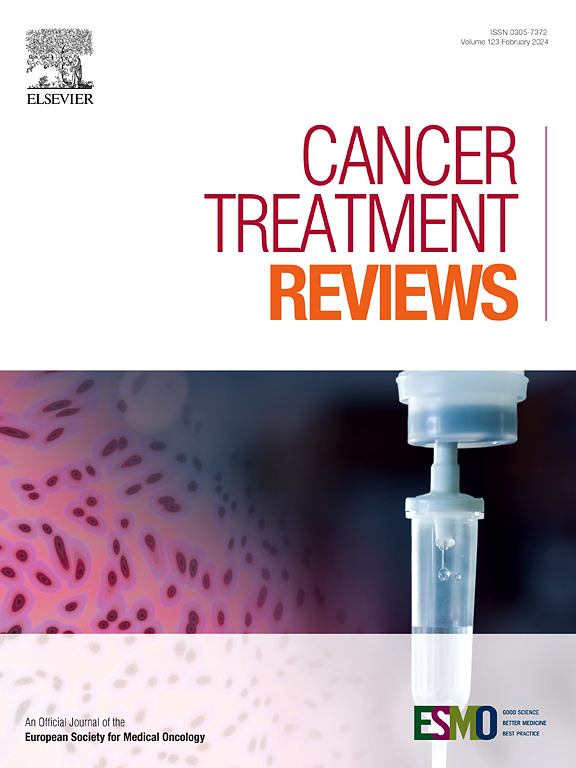对年轻成年癌症幸存者的长期监测建议
IF 10.5
1区 医学
Q1 ONCOLOGY
引用次数: 0
摘要
癌症治疗的进步导致年轻成年癌症幸存者(YACS)的生存率增加。然而,这些个体面临独特的长期健康风险,包括继发性恶性肿瘤、心血管疾病和社会心理挑战。有效的长期监测战略对于减轻这些风险和改善健康结果至关重要。本次范围审查的目的是总结现有的长期监测YACS的建议,确定当前指南中的差距,并强调未来研究的领域。方法使用Pubmed对2015年1月至2025年1月间发表的同行评议文献进行范围综述,这些文献涉及YACS治疗后(诊断后5年)随访策略。该综述综合了各种癌症类型、治疗方式和长期影响的建议。结果本综述确定了32项建议。在最初检索到的所有符合条件的文章中,经过筛选和合格后纳入了169篇不同的文章。研究结果表明,缺乏标准化的、针对特定年龄的监测指南,大多数建议改编自儿科或成人肿瘤框架。新出现的证据表明,基于风险的个性化监测方法——结合遗传易感性、治疗史和生活方式因素——可能优化长期健康结果。本综述强调了为YACS量身定制适合年龄的循证监测指南的必要性,并强调了多学科护理模式对支持生存的重要性。未来的研究应侧重于制定标准化、风险分层的监测方案,并评估其对健康结果的影响。本文章由计算机程序翻译,如有差异,请以英文原文为准。
Long-term surveillance recommendations for young adult cancer survivors
Background
Advancements in cancer treatment have led to increased survival rates among young adult cancer survivors (YACS). However, these individuals face unique long-term health risks, including secondary malignancies, cardiovascular disease, and psychosocial challenges. Effective long-term surveillance strategies are critical to mitigating these risks and improving health outcomes. This scoping review aims to summarize existing recommendations for long-term surveillance of YACS, identify gaps in current guidelines, and highlight areas for future research.
Methods
A scoping review was conducted using Pubmed focusing on peer-reviewed literature published between January 2015 and January 2025 that addresses post-treatment (>5 years after diagnosis) follow-up strategies for YACS. The review synthesizes recommendations across various cancer types, treatment modalities, and long-term effects.
Results
The review identified 32 recommendations. Of all eligible articles initially retrieved, 169 different articles were included after screening and eligibility. Findings indicate a lack of standardized, age-specific surveillance guidelines, with most recommendations adapted from pediatric or adult oncology frameworks. Emerging evidence suggests that risk-based, personalized surveillance approaches—incorporating genetic predisposition, treatment history, and lifestyle factors—may optimize long-term health outcomes.
Discussion
This review underscores the need for age-appropriate, evidence-based surveillance guidelines tailored to YACS and highlights the importance of multidisciplinary care models to support survivorship. Future research should focus on developing standardized, risk-stratified surveillance protocols and evaluating their impact on health outcomes.
求助全文
通过发布文献求助,成功后即可免费获取论文全文。
去求助
来源期刊

Cancer treatment reviews
医学-肿瘤学
CiteScore
21.40
自引率
0.80%
发文量
109
审稿时长
13 days
期刊介绍:
Cancer Treatment Reviews
Journal Overview:
International journal focused on developments in cancer treatment research
Publishes state-of-the-art, authoritative reviews to keep clinicians and researchers informed
Regular Sections in Each Issue:
Comments on Controversy
Tumor Reviews
Anti-tumor Treatments
New Drugs
Complications of Treatment
General and Supportive Care
Laboratory/Clinic Interface
Submission and Editorial System:
Online submission and editorial system for Cancer Treatment Reviews
 求助内容:
求助内容: 应助结果提醒方式:
应助结果提醒方式:


